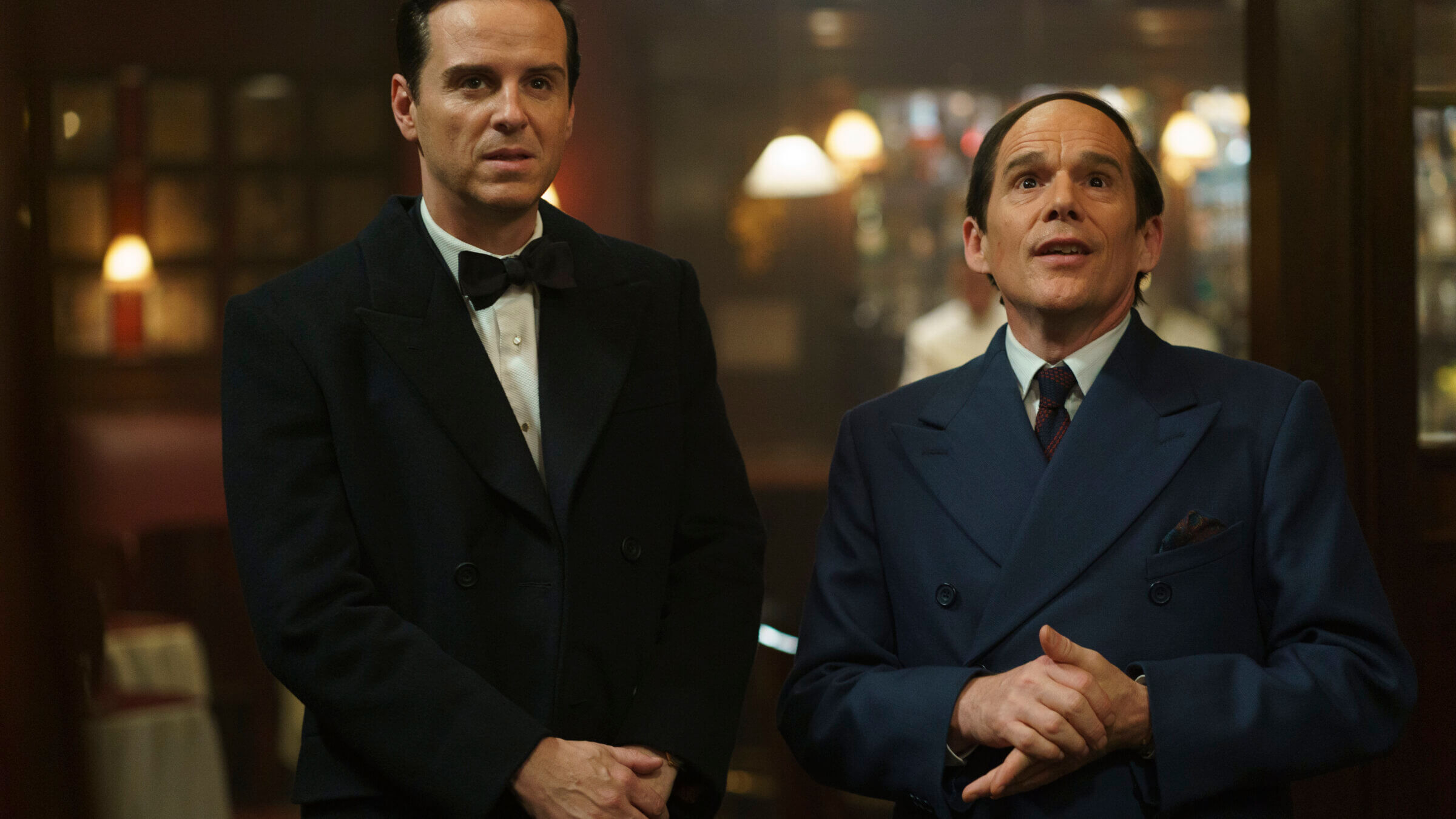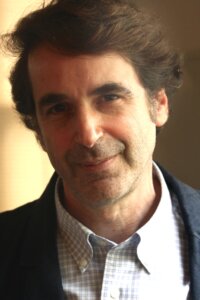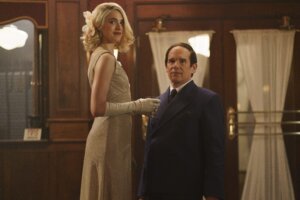How a Jewish schoolteacher from New Jersey made it to Hollywood and Broadway at the same time
In ‘Blue Moon,’ Robert Kaplow joins forces with Ethan Hawke and Richard Linklater to give a tragic genius his due

Andrew Scott and Ethan Hawke as Rodgers and Hart in Richard Linklater’s ‘Blue Moon.’ Courtesy of Sony Pictures Classics
Robert Kaplow, a retired high school English teacher, has been publishing a monthly newsletter in Metuchen, a small New Jersey town a few miles southwest of Menlo Park, where Thomas Edison set up his laboratory. Kaplow can’t match Edison’s thousand plus patents but the 71-year-old writer has had an impressive creative output. Over the years, he’s churned out a play, a screenplay, nine novels and hours of radio comedy that gained a cult following on NPR.
One of his novels, Me and Orson Welles, was turned into a motion picture. His screenplay, Blue Moon, began life as a monologue and tackles the tragic end of lyricist Lorenz Hart’s life. Kaplow worked on Blue Moon over the course of 14 years.
The film, directed by Richard Linklater, presents the unraveling of Hart’s musical theater career and serves up a glimpse of his sad personal life. Hart was gay but he wasn’t completely comfortable with his sexual identity. Based on actual correspondence that Kaplow bought at an estate sale, the screenplay presents the lyricist as a man infatuated with a college woman half his age. The movie opens with two quotes about Hart in an epigraph. The first describes the lyricist as “alert and alive and fun to be with.” The second refers to him as “the saddest man I ever knew.”
‘An extraordinary teacher’

Kaplow taught English and film at Summit High School in New Jersey for 34 years.
“He was an extraordinary teacher,” said Sally Ball, who was a high school student of Kaplow’s in the mid-1980’s and is now a published poet and an English professor at Arizona State University. “He lived the life of a writer. He really made a literary life seem like a living thing to me.”
Kaplow scored autographed pictures for his high school students of the actor Zac Efron, who starred in Me and Orson Welles. The 2004 novel was turned into a feature film by Linklater. Set in the 1930’s, it told the story of a New Jersey high school student who manages to snag a role in Welles’ groundbreaking production of Julius Caesar.
While he was teaching, Kaplow also made a mark in public radio with his alter ego, a comedic character named Moe Moskowitz. The wisecracking, loud-mouthed Moskowitz was the polar opposite of his soft-spoken creator. Billed as “America’s favorite entrepreneur,” Moskowitz brightened the airwaves on Morning Edition with wacky ideas and get-rich-quick schemes.
A gorilla comedian
Kaplow’s first foray into comedy and drama took place when he was ten. Encouraged by his father Jerome, he donned a full-face gorilla mask and casually looked out the window of the family sedan on the drive to the beach. The sight of the little gorilla in the backseat caused the occupants of other cars to do a double-take, which was often followed by an explosion of laughter.
That comedic impulse showed no sign of abating during his adolescence. On the first page of his prayer book, a Reform siddur, Kaplow provided a divine inscription: “Bob – Best of luck in the future (as if I didn’t know!) – God.”
In high school Kaplow and his friends, inspired by the trippy, multi-track comedy of Firesign Theater, wrote, performed and recorded what he called “little satirical theater pieces.”
When Kaplow attended Rutgers University, he spent most of his time in a band called The Punsters, which produced a weekly radio program of the same name. It featured a half-hour of original comedy, some of which Kaplow would eventually recycle for NPR.
‘The only prayer I know’
At family gatherings, Kaplow’s father, a car salesman, was always the life of the party. At the local White Castle where the counter women were Haitian, Jerome Kaplow would pretend he was a native French speaker when he ordered. And he performed cameos on his son’s radio comedy segments on NPR. When Jerome went to the hospital for an echocardiogram and a technician asked what he did for a living, the elder Kaplow replied: “I’m retired, but I used to be in show business.”
“My father had an ironic, absurdist sense of humor,” Kaplow told me. “I picked up so much from him.”
Jerome lived to 94, deriving much of his sustenance from Milky Way candy bars and gefilte fish, according to his son. Even when he could barely walk, Jerome insisted on going to shul on the High Holy Holidays.
“My father didn’t attend services because he was deeply religious,” Kaplow explained. “He attended because his father was deeply religious — and he felt the need to honor his father’s convictions.”
Religious observance seems to have declined with each generation of the Kaplow family but Robert Kaplow told me he does regularly go to the cemetery to place stones on the graves of his grandparents, mother, father and sister.
“Sometimes I mutter Shema Yisrael,” he told me. “It’s the only prayer I know.”
‘Kaplow’s gift’
When Kaplow was with The Punsters, they recorded a song titled “I Dreamt I Dreamt of Gefilte Fish,” in which Kaplow mimicked Bob Dylan singing about eating nothing but gefilte fish. In the 70-second ditty “Batman’s Going to a Bat-Mitzvah,” the caped crusader, we learn, is going to chow down on “rugelach and arugula.” A Moskowitz Home Companion,” Kaplow’s parody of A Prairie Home Companion, was sponsored by the fictional “Moskowitz’s Frozen Knishes.”
Kaplow says he was fired from NPR three times — first because Moe Moskowitz was deemed to be a Jewish stereotype, second, according to veteran Morning Edition producer Barry Gordemer, because “some people in the building didn’t think Moe was funny,” and lastly because Kaplow used the network’s logo without permission on a self-produced CD of his Morning Edition comedy segments. You can still find that CD (Cancel My Subscription: The Worst of NPR) on YouTube.
Jay Kernis, Morning Edition’s founding producer, was in Washington, D.C. when Kaplow was being interviewed about the song he sent in, “Steven Spielberg, Give Me Some of Your Money.” Out of the blue, Kaplow started talking in his Moe Moskowitz voice. Kernis called the control room in New York when the interview had concluded and asked Kaplow if he wanted to contribute original comedy to Morning Edition on a regular basis.
Kernis noted that back in the days when NPR aired original comedy and commentary on its newsmagazines, contributors tended to last a couple of years. Then, he said, either NPR producers or the audience grew tired of them. Kaplow lasted 17 years.
“Robert was inventive and he was funny,” Kernis told me. “He was a great performer and a great sound producer.”
“Moe Moskowitz always made me laugh, but also sometimes put a catch into my throat,” Weekend Edition host Scott Simon wrote in a text. “Robert has a gift — an art, really — for putting character into what might otherwise seem a caricature.”
‘An old-fashioned human being’
Kaplow and Richard Linklater kept in touch after Me and Orson Welles had its theatrical run in 2008. When Kaplow mentioned that he had written a monologue about Rodgers and Hart, Linklater asked to read it and, afterwards, shared it with the actor Ethan Hawke, who he tapped to play Lorenz Hart.

Kaplow completed the first draft of the Blue Moon screenplay in the Summer of 2011. In the ensuing years Linklater and Hawke worked with Kaplow on revising it, right up to and during the shoot last summer in Ireland where Kaplow joined them on set.
“We were a good band together,” Hawke told me.
The film takes place on one night in 1943 at Sardi’s, the theater district restaurant, as Hart’s songwriting partner Richard Rodgers basks in the opening night raves of Oklahoma!, Rodgers’ first collaboration with his new writing partner Oscar Hammerstein II.
Hart was struggling with alcoholism and depression during the time the film depicts. He died eight months after the Oklahoma! opening at the age of 48.
“It is hard for us to look at people in pain,” Hawke told me. “People in pain often behave badly, so they’re unlikable. But we have all been that person. We’ve all struggled with the green-headed monster of jealousy. We’ve all been worried that our best days are behind us.”
Linklater said one of the triumphs of Kaplow’s screenplay is that it managed to convey empathy for Lorenz Hart.
“I’m proud that 82 years later we’re honoring him and his contribution to our world,” Linklater said of the lyricist. “There’s no one else like him.”
Hawke described Robert Kaplow as “an old-fashioned human being,” which isn’t surprising given Kaplow’s love of the American songbook, especially its golden age. When he was in his 20’s, Kaplow was so enamored of the Tin Pan Alley era that he wanted to write music for theater.
“When you look at the songwriters of the 1930s and 40s, with the exception of Cole Porter, they’re almost all Jewish,” Kaplow told me. “Rodgers and Hart, Kern, Arlen, Julie Styne and Sammy Cahn. I don’t have an explanation for why, but I feel a little bit like I’m part of that. Whatever that cultural DNA is, I have a little of that.”
















